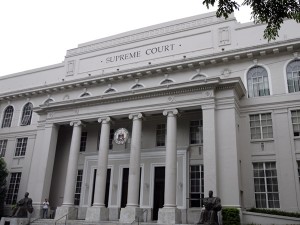SC to continue hearing on PLDT foreign ownership
MANILA, Philippines—The Supreme Court will continue its oral argument Tuesday on the question of foreign ownership of telephone giant Philippine Long Distance Telephone Company.
During the last hearing held in Baguio, PLDT lawyer Victor Lazatin said if the tribunal does not reform its earlier ruling on the controversy, the decision “will discourage foreign investments and expose the government to investor suits under bilateral treaties.”
Lazatin clarified that while in the case of PLDT, 36 per cent of its common shares are owned by Filipinos and 64 per cent are in foreign hands it does not mean that foreigner control the public utility.
The oral arguments was set by the Supreme Court over PLDT and other businesses seeking consideration of the court’s decision construing the term “capital” in the Constitutional provision limiting foreign ownership of domestic public utilities.
Expected to argue Tuesday is the government, through Solicitor-General Francis Jardeleza.
PLDT chair Manuel Pangilinan and others asked the Supreme Court to reverse its decision changing the calculation to determine foreign ownership in public utilities because it sends wrong signal to foreign investors that they are not welcome in the Philippines.
Pangilinan, in his petition said “if the Court does not reconsider, that unwarranted redefinition will have very serious adverse repercussions for the partially nationalized industries affected, the Philippine capital market, the Philippine economy in general and the country as a whole.”
Aside from Pangilinan, PLDT president Napoleon Nazareno and the Philippine Stock Exchange (PSE) filed their separate motions seeking a reversal of the high court’s decision and asked that a temporary restraining order and/or writ of preliminary injunction be issued to stop the SEC from conducting its investigation.
The high court said “capital” refers to shares of stock entitled to vote in the election of directors and thus refers only to common shares and not to the total outstanding capital stock.
Such definition, the high court said should be used in determining the extent of allowable foreign ownership in respondent PLDT and if there is a violation of Section 11 Article 12 of the 1987 Constitution.
The respondents, in their motions said that the ruling that foreigners may own up to only 40% of a public utility’s voting stock (instead of up to 40% of its entire capital stock) “is not justified: by the text of the Constitution; the clear intent of the 1986 Constitutional Commission that drafted it; nor by the economic conditions confronting the country.”
As a result, the high court invited constitutional law expert Joaquin Bernas and economics academician Bernardo Villegas to appear as amici curiae to explain the definition of the word “capital” as stated under the 1987 Constitution. The two are expected to share their views in today’s oral argument.
